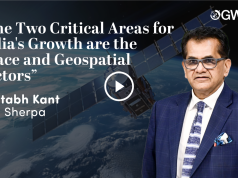Last-mile delivery has been a contested field with frail optimization and a longing for accurate distribution. Through geospatial, most inaccuracies of last-mile are resolved, providing enhanced value for the entire supply chain.
Geospatial Artha Summit 2024’s session on “Optimizing Last Mile Delivery with Geospatial Intelligence” brought together industry leaders who provided comprehensive insights into the challenges and innovations in the field.
Moderated by Dhruva Rajan, Entrepreneur and Ex-Founder, GeoSpoc, the panel exchanged thought-provoking, solution-oriented last-mile delivery retorts.
Enhancing Efficiency
Prashant Parashar, Senior Vice President and Head of Technology at Delhivery spoke about the implementation of deep learning techniques to enhance the efficiency of last-mile delivery.
He raised crucial points about the significance of public information and also stressed the need for accessible public data through APIs, envisioning it as a valuable resource to enhance optimization strategies.
Meanwhile, Lakshmi Narasimhan, Head of Uber Maps India, highlighted the importance of predicting optimal routes among the fleet of vehicles and highlighted the need for predictive analysis to assist vehicle drivers.
He also emphasized the critical role of indoor maps in providing precise directions, especially in complex environments. “Building an intelligent system capable of suggesting the most efficient walk points for riders is crucial for enhancing the overall capability and optimization of routes,” Lakshmi said.
“The integration of augmented reality and algorithms also extended to assisting drivers in locating amenities like restrooms, tailored to individual preferences and optimizing routes based on driver profiles,” he added.
Agro Productivity
Bringing the agriculture sector into the discussion, Sidharth Sinha, Geo and Climate Policy Lead of Google India said, “Geospatial technology could significantly contribute to improving the productivity of farmers.”
He discussed the positive outcomes of geospatial policy reforms and their impact on optimizing supply chains while reflecting on the private sector’s perpetual challenge of balancing sustainability with profitability.
Talking about Google’s Project Green Light he said, “This project, utilizing AI and Google Maps, aims to model traffic patterns globally, offering intelligent recommendations to city traffic engineers for optimizing traffic flow.”
Challenges
Ashwanii Rawat, Director-Project Management of Precisely delved into the persisting challenges faced by last-mile delivery companies, expressing concerns about profitability.
“Despite the availability of cutting-edge technologies, the lack of sufficient data in the country is hindering effective optimization,” he said.
He further proposed the development of a fabric system to map addressable units, aiming to enhance the cost-effectiveness of last-mile delivery.





